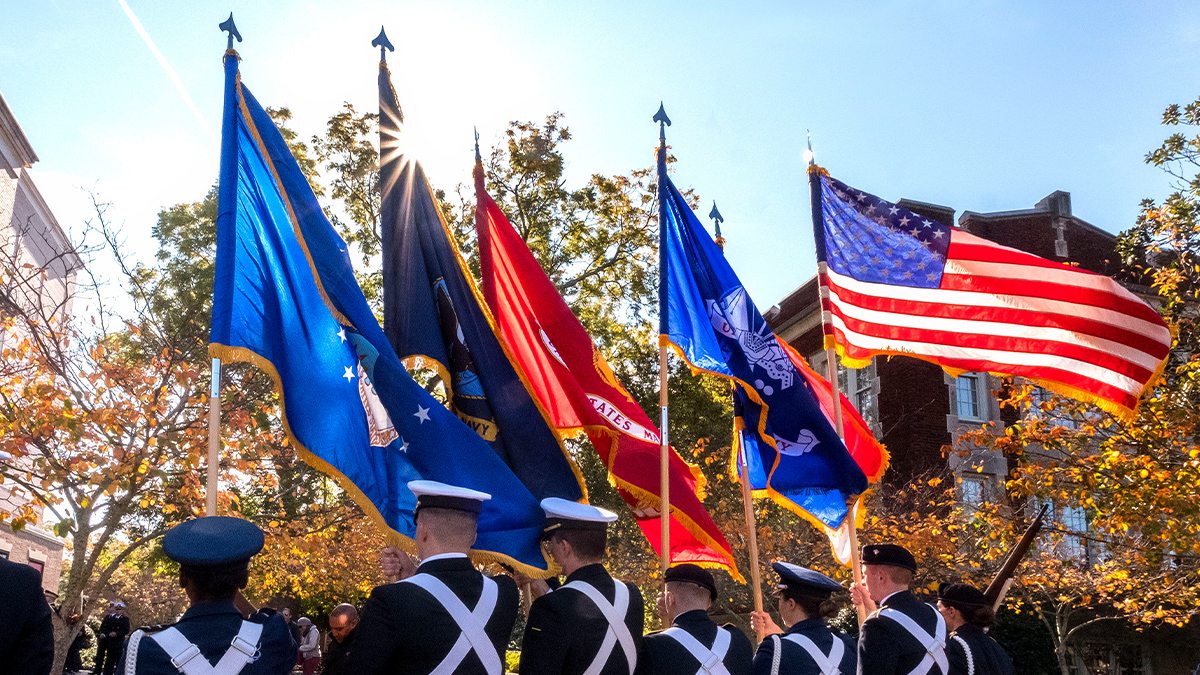Carolina students will help to share veterans’ stories in ‘After the War’
The Mellon Foundation-funded digital archive of veteran experiences will debut in June 2023 and is presented in part by Carolina’s Southern Oral History Program.

To help tell the stories of American veterans, Carolina undergraduate students will combine archival research and future-forward technical skills in a hands-on history course.
Hooper Schultz, history Ph.D. student and UNC Southern Futures Townsend Fellow, instructs the Undergraduate Oral History Internship and Seminar, a class presented by the Southern Oral History Program in the College of Arts and Sciences.
Each semester, Schultz’s students are immersed in oral histories — audio interviews focused on personal accounts of historical events. In class, students explore oral history theory, methodology and ethics alongside technical skills needed to share the histories with the public, including website coding.
They then put their course knowledge into practice by contributing to a public humanities project.
This spring, that project will be “After the War,” a digital exhibition highlighting veterans’ experiences once they have returned home from serving their country.
Cassie Tanks is the project lead for “After the War,” which is funded by The Andrew W. Mellon Foundation and the University of New Hampshire.
Tanks, who earned her master’s in library science at UNC and is now a world history Ph.D. student at Northeastern University, was inspired by personal experiences to create the digital exhibition. She grew up in Southern California, home to military bases, including Camp Pendleton Marine Corps Base, and her husband is a combat veteran.
“I want to create a space for veterans to tell their stories about what it was like after the war,” said Tanks. “Because going in is one thing, but what about after you’ve finished your term?”
Schultz’s students will shed light on that question through their coursework. They’ll start by familiarizing themselves with the SOHP’s existing oral history archives, one of the largest in the country.
The SOHP has collected more than 6,500 oral histories that are preserved and made accessible by staff at the Wilson Special Collections Library. Once the students have explored the archives, they’ll each choose one interview to focus on.
“They’ll think really deeply about the context of that oral history and who that person is,” said Schultz. Then, “they’ll take clips from the oral history and, with Cassie’s help, they’re going to be able to build this digital exhibit.”
Tanks, who worked with Schultz to develop The Story of Us — an archive of LGTBQIA Carolina students’ experiences across generations — during her master’s work at UNC, is thrilled that Schultz’s students will be contributing to “After the War.”
An expert in the technical aspects of building a digital archive — including designing and coding sites — Tanks will be a guest lecturer in Schultz’s class next semester. One of Tanks’ goals is that students leave the class with an enhanced technical toolset and confidence navigating digital archives.
“The students will be able to have a really critical view of how effective or ineffective the archive is,” she said. “And, through their work creating this exhibit site, they will improve upon the archive as a space.”
Schultz’s students will finish their “After the War” exhibit sites in May 2023, in time to contribute them to the complete exhibition, which is set to debut to the public in June.
Schultz hopes visitors to “After the War” will feel empowered to seek out other publicly accessible archival resources. He also hopes visitors will gain a “greater understanding of the experiences of American veterans after they return from service.”
Tanks agreed. “What’s so great about this project is that people will explore how being a veteran is not a totalizing experience.”
The curating and sharing of the SOHP’s archives and others like it make such exploration possible.
“Archiving should be an optimistic and future-forward act,” Tanks said. “Yes, you’re working with the past, making the past findable and searchable. But we’re not doing it for the past’s sake. We’re doing it for the future, for imagining a better future.”




